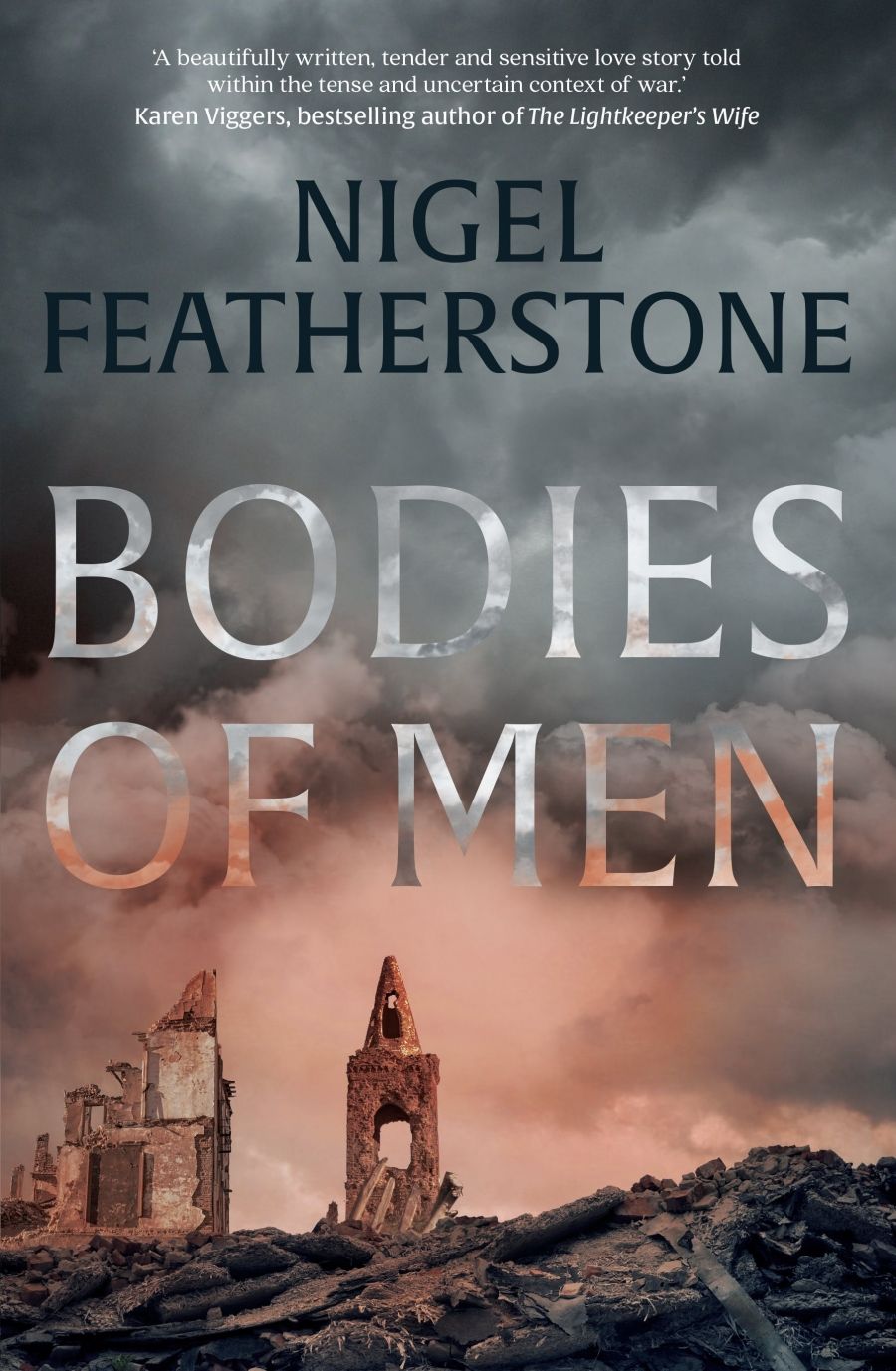
- Free Article: No
- Contents Category: Fiction
- Custom Article Title: Patrick Allington reviews <em>Bodies of Men</em> by Nigel Featherstone
- Review Article: Yes
- Online Only: No
- Custom Highlight Text:
From its raw and revelatory prologue, Nigel Featherstone’s novel Bodies of Men offers a thoroughly humanising depiction of Australians during World War II. In telling the story of two soldiers, William – too young to be a corporal – and his childhood friend ...
- Book 1 Title: Bodies of Men
- Book 1 Biblio: Hachette, $32 pb, 326 pp, 9780733640704
Featherstone weaves a compassionate tale but one that contains multiple layers of tension. It is also persistently surprising, as if the author has found a way to keep the ground beneath the characters – and readers – constantly shifting. William is a study in anxiety about his soldierly chops. He is keen for his men to see him as a good and proper influence, and he is mindful of the need, at least publicly, to do the right thing by God, King, and Country. But he remains in the shadow of his father, Roy Carrington Fisher Marsh MP, a man with rigid, élitist views and a thirst for unpleasant behaviour towards his family and others. James, meanwhile, endears himself to Yetta and Ernst, though not to their daughter. Gradually he convalesces, reading, brooding, and revealing his free spirit despite being bedridden and housebound.
Although William and James dominate the story, Featherstone draws upon a range of intriguing, deftly drawn characters; his characterisations of women are particularly rich and complex. Yetta is fascinating for her motivation, poise, and vulnerability, for the glimpses she offers James of her inner world and personal history, for the solace she takes in working and harvesting her tiny garden, for the force of her views: ‘Our job is to worry only about the present,’ she tells William at one point. Back home, James’s mother is a long-time and committed pacifist, as well as a shopkeeper in difficult times. When James tells her that he has enlisted, she insists that, whatever he endures and whatever his physical wounds, ‘you will still know who you are, and you will still know who I am, and we will recognise each other’. And then there’s William’s mother, for decades enduring an unhappy marriage to an awful man. She also has her secrets.
 Nigel Featherstone (photograph by Andrew Sikorski)Featherstone’s depiction of war and wartime relies little on grand battles between armies or the machinations of Great Leaders. It is affecting and nuanced because he dwells on emotions and because the bubble of war in northern Africa remains connected in multiple ways – emotional as well as geopolitical – to the wider world. At times, the prose is reminiscent of Thomas Keneally’s keen and extended gaze, his swirling, exuberant dance with history. Featherstone also has a fine eye for small detail, whether it’s the dust and wind of the desert or the narrow streets of Alexandria, and for phrasing that disarms: ‘Three more Italians emerge from behind the boulder, arms in the air; they look like they’re carrying an invisible boat.’ The simplicity of the prose both anchors and elevates the story. It adds dismaying layers too: there is something deeply confronting about William grappling with the need to be ‘a valuable member of the Australian Imperial Force’ by being an effective enough soldier that he can kill another human being.
Nigel Featherstone (photograph by Andrew Sikorski)Featherstone’s depiction of war and wartime relies little on grand battles between armies or the machinations of Great Leaders. It is affecting and nuanced because he dwells on emotions and because the bubble of war in northern Africa remains connected in multiple ways – emotional as well as geopolitical – to the wider world. At times, the prose is reminiscent of Thomas Keneally’s keen and extended gaze, his swirling, exuberant dance with history. Featherstone also has a fine eye for small detail, whether it’s the dust and wind of the desert or the narrow streets of Alexandria, and for phrasing that disarms: ‘Three more Italians emerge from behind the boulder, arms in the air; they look like they’re carrying an invisible boat.’ The simplicity of the prose both anchors and elevates the story. It adds dismaying layers too: there is something deeply confronting about William grappling with the need to be ‘a valuable member of the Australian Imperial Force’ by being an effective enough soldier that he can kill another human being.
There are moments when the various elements of the intricate plot, and the way the individual circumstances of different characters intersect, fall into place too neatly. Nonetheless, the reader who is willing to suspend disbelief will reap rewards. At one point, William says to some desert-camp dwellers, ‘I’m so very sorry for all this dreadful business’. His apology, while genuine, is utterly lame, and the sentiment seems to capture so much of the awful reality of war that unfolds in Bodies of Men. This is also a novel about intimacy and devotion, the power of tenderness, the mysteries of time, presence, and absence, secrets revealed and withheld, and friendships between strangers emerging from dire circumstances. As Ernst says to James at one point, ‘there is nothing more important than love and refuge’.


Comments powered by CComment